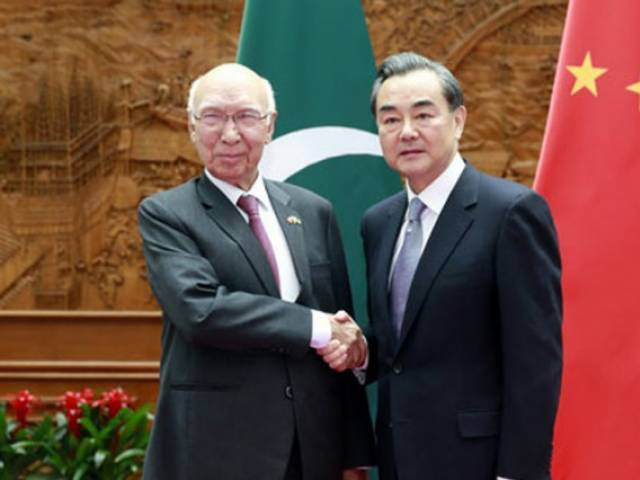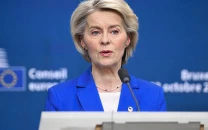Will China be able to sort out Pakistan and Afghanistan’s differences?
To Afghanistan’s advantage, China has also stepped up efforts to integrate her in Central Asia and Eurasia

PHOTO: FILE
Since 2002, Washington alone has handed out $115 billion to Kabul while the rest of the world gave away $15 billion. Afghanistan’s 80% budget is financed by foreign aid. The country seems to have marginally improved in terms of institutions building, infrastructure and security. But its bureaucracy remains in shambles, while political infighting and widespread corruption has taken a toll on an average Afghan.
China aims to thaw frosty India, Pakistan ties
The unexpectedly high pledges in times of global turmoil and donor fatigue won’t be easy to materialise without solid clampdown against corruption and human trafficking. Afghans form the largest group of asylum seekers entering the EU territories in tens of thousands, majority of whom failed to get the refugee status. EU conditioned its $1.5 billion aid to Afghanistan’s progress in anti-corruption and return of failed asylum seekers.
"We're buying four more years for Afghanistan," said EU special representative Franz-Michael Mellbin in the Conference. Afghan officials have downplayed the preconditions of the pledged assistance.
Afghan security forces remain demoralised with insider attacks and desertions. From Northern provinces, such as Kunduz, the central region of Uruzgan, to eastern and southern areas, Afghanistan is faced with resurgent Taliban. And amid erosion of the writ of the state, gains from Kabul’s recent peace deal with Hizb-i-Islami appear miniscule.
For almost a year, Afghanistan has abandoned bids for politically negotiating settlements with Taliban through the Quadrilateral Coordination Group (QCG) forum. Kabul will sooner than later have to shun its hardline policy and return to QCG process. Not only are its resources shrinking amid mounting challenges, the gains achieved since 2002 are also highly threatened.
Pakistan, China reaffirm to continue efforts for peace in Afghanistan
Over the last two years, Ghani-Abdullah government has opted to strengthen its relations with India, costing relations with Pakistan. The ties between the latter remain at the lowest ebb after Afghanistan followed India’s decision to boycott SAARC summit in Islamabad. Nonetheless, Pakistan sees Afghanistan as its conjoined twin. The landlocked Central Asian nation has relied on its eastern and southeastern neighbour for trade and travel for centuries.
Besides giving $1 billion development assistance to Afghanistan, Pakistan continues to host over 1.7 million registered Afghans. The country has borne the financial and societal brunt of the refugees, despite being given a meagre $230 million from the UNHCR budget. Kabul often acknowledges Islamabad’s support on the refugee issue, but shies away from chalking out a viable plan for their repatriation. With soaring insecurity, more Afghans are likely to pour into Pakistan compared to ones being systemically repatriated by the UNHCR.
Not only is Pakistan vital for Afghanistan’s progress and prosperity, the latter also holds the same significance for the former. Islamabad’s ambitious plans to serve as the link between other Central Asian states and Eurasia are only viable if Afghanistan is peaceful, stable and friendly with her. The recent announcement of $500 million aid reflects the importance Pakistan attaches to Afghanistan. But Ghani-Abdullah government has repeatedly tried to bid for Modi’s government and seek transit concessions for India, which are purely dependent on the relations between both the nuclear-armed rivals.
Pakistan, China upbeat over Afghan peace prospects
In fact, it will be more pragmatic for Afghanistan to use Pakistan’s land route to connect with a much better and influential partner, China. Though Afghanistan and China do share a border in the Wakhan Corridor, the narrow, treacherous region has only one communication channel called the Wakhjir Pass in the Hindu Kush or Pamirs. Linking Wakhan in Afghanistan with Tashkurgan Tajik region in Xinjiang, China, the 5,000 metre high pass is neither an official border nor has road connections on either side. Moreover, harsh weather conditions dominate for five months.
Instead of pursuing antagonistic policy against Pakistan to appease India, Afghanistan can utilise Pakistani infrastructure under CPEC to access Chinese markets and resources.
“We are not merely going to connect Pakistan and China through the Gwadar-Kashgar motorway, Pakistan will build the Peshawar-Kabul motorway that will connect to the Kabul-Kunduz motorway, [which] will then get into [the Central Asian nation of] Kyrgyzstan,” Tariq Fatemi told diplomats and experts in Islamabad recently.
Meanwhile, it can maintain India-Iran corridor for trade through Chabahar port. On the other hand, with SAARC increasingly becoming meaningless, the Central Asia Regional Economic Cooperation Program (CAREC) is a promising forum, with partnership of 10 countries to promote development through regional cooperation. Besides China, Pakistan and Afghanistan, the other CAREC members include Azerbaijan, Kazakhstan, Kyrgyz Republic, Mongolia, Tajikistan, Turkmenistan and Uzbekistan.
To Afghanistan’s advantage, China has also stepped up efforts to integrate her in Central Asia and Eurasia. This August, Beijing organised joint counter-terror exercises with Pakistan, Afghan and Tajik militaries. Later, the four respective army chief attended the concluding ceremony. The forum can help Pakistan and Afghanistan overcome disputes with China’s meditation. Posturing against Pakistan and bidding for India is, nonetheless, suicidal for Afghanistan’s short-term as well as long-term interests. It’s time for Kabul to respond affirmatively to Islamabad’s embrace in Brussels.
Naveed Ahmad is a Pakistani investigative journalist and academic with extensive reporting experience in the Middle East and North Africa. He is based in Doha and Istanbul. He tweets @naveed360



















COMMENTS
Comments are moderated and generally will be posted if they are on-topic and not abusive.
For more information, please see our Comments FAQ